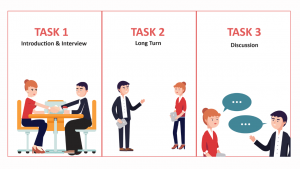
Understanding the IELTS Speaking Section
Welcome to guide on preparing for the IELTS Speaking Section! This crucial part of the IELTS exam often makes candidates nervous, but with the right preparation and practice, you can excel. In this article, we will delve into expert tips, strategies, and insights to help you feel confident and ready on exam day. Let’s start by understanding the structure and format of the IELTS Speaking Section. This section is designed to assess your ability to communicate effectively in English. It consists of three parts, each with a specific focus.Part 1: Introduction and Interview
In this section, the examiner will ask you general questions about yourself, your interests, and everyday topics. It’s essential to answer these questions clearly and concisely while showcasing your speaking abilities.Part 2: Long Turn
Next, you will be given a task card with a particular topic. You will have one minute to prepare and then speak about the topic for 1-2 minutes. This part tests your ability to speak at length on a given subject.Part 3: Discussion
Finally, you will engage in a discussion with the examiner related to the topic in Part 2. This section assesses your ability to express opinions, analyze ideas, and engage in a conversation.How is the IELTS Speaking Section Scored?
Throughout the three parts of the speaking IELTS test, you are evaluated on 4 criteria:![ielts coaching]()

- Vocabulary
- Pronunciation
- Fluency and cohesion
- Grammar
Prepare for the IELTS Speaking Test
Now that you have a clear picture of the pattern, start off with your preparations by making a study plan and then sticking to it.- Dedicate half an hour each day to either listening or reading something in English. When you read, do it aloud. It helps in pronunciation.
- Commit another half an hour every day to speaking English, preferably with another person who is fluent in the language.
- Learn the correct grammar and functional language use specific to topics the test asks.
- Since the speaking test is a representation of real life, it is better to imitate this aspect while preparing. Instead of writing down the answers to questions, find a study partner. Talk to them and practice by answering their questions.
- If you cannot find a partner, speak to a mirror or, better yet, record your answers. Listening to the audio will help you improve pronunciation, modulation and fix grammar errors.
- A common reason why candidates get low scores in the speaking test is brief answers. Therefore, while preparing, try to explain your answers. E.g., for the question ‘Do you often wear makeup?’ The answer ‘No, I don’t prefer to wear makeup frequently because I feel it damages the skin and masks my identity’ is likely to get more marks than the answer ‘No, I don’t wear makeup often.
Where To Study for the IELTS Speaking Section From?
- This is one section of the IELTS that can’t be learned from a book, but the official IELTS practice materials are an excellent place to start for sample questions.
- English news channels and podcasts are another resources to study for the speaking test.
- To get your pronunciation correct, use online dictionaries that let you listen to how a word is articulated.
- The ieltsmaterial.com is a website that has a lot of useful material for the IELTS speaking test practice.
- The British Council site is also a sound resource.


